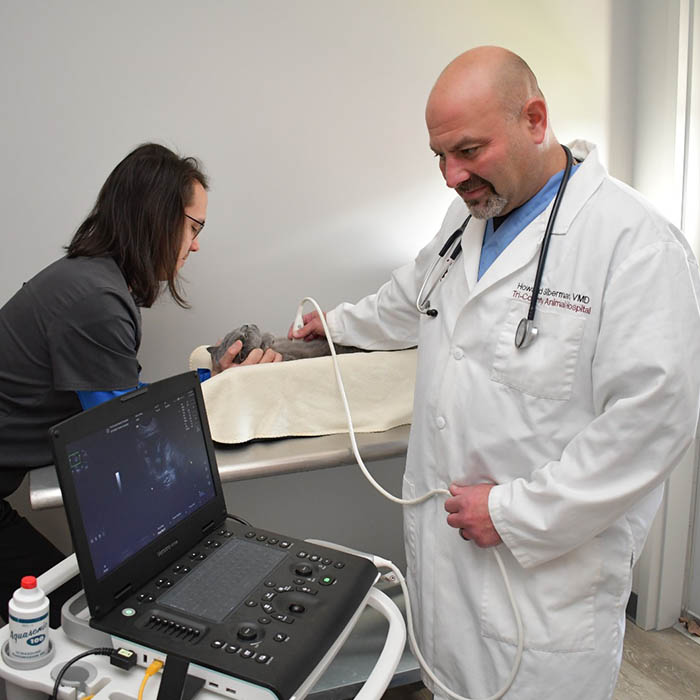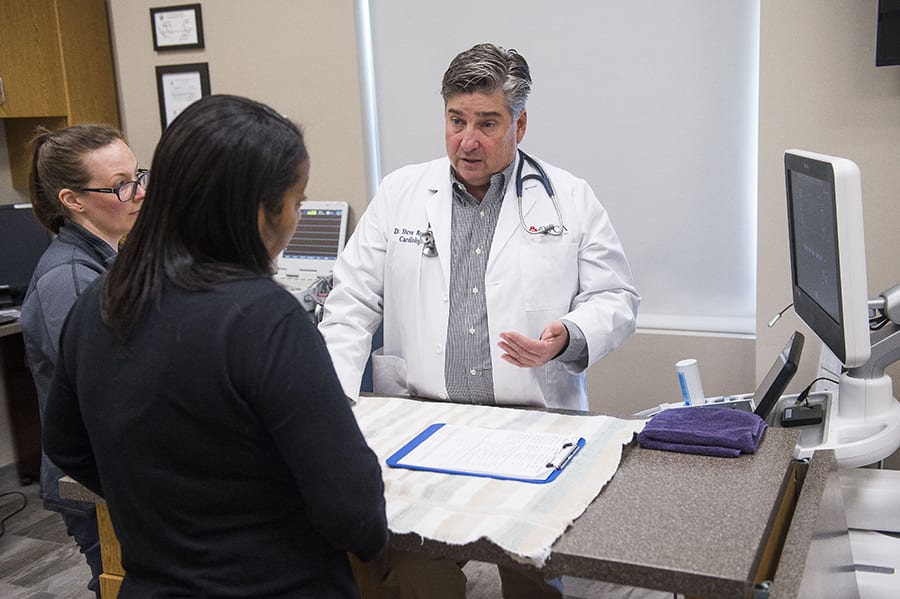Discovering the Necessary Services Supplied by a Vet Cardiologist: Recognizing Ultrasound and CT Check Strategies
Vet cardiologists play an essential function in the health of family pets by diagnosing and treating various heart conditions. They use advanced imaging methods, such as heart ultrasound and CT scans, to provide exact assessments. Each approach has its distinct benefits and applications. Understanding these methods is crucial for pet owners seeking the ideal treatment for their friends. What variables should animal proprietors consider when selecting in between these analysis tools?

The Function of Vet Cardiologists in Pet Dog Health Care
Veterinary cardiologists play a crucial function in the health care of animals, concentrating specifically on detecting and treating heart-related problems. They possess specialized training that enables them to interpret intricate diagnostic tests and identify numerous cardio problems. These specialists utilize sophisticated strategies, such as echocardiography and electrocardiography, to examine heart function and framework accurately.Veterinary cardiologists likewise create tailored therapy strategies that may consist of medications, lifestyle alterations, and, sometimes, surgical interventions. Their competence extends to enlightening animal owners regarding heart health, emphasizing the significance of normal check-ups and very early discovery of prospective issues. Partnership with basic vets is important, as it guarantees detailed treatment for family pets with thought heart problems. By providing specialized services, vet cardiologists considerably boost the lifestyle for animals and give satisfaction for their owners, strengthening the significance of heart health in overall family pet wellness.
Usual Cardiac Problems in Pet Dogs
Common heart concerns in animals can greatly affect their health and wellness and lifestyle. Heart murmurs, different kinds of cardiomyopathy, and congenital heart problems are among one of the most prevalent problems that veterinarians come across. CT Scans For Dogs. Recognizing these concerns is essential for pet owners to assure prompt medical diagnosis and ideal treatment
Heart Murmurs in Pets
Heart murmurs can be a source of problem for pet owners, they are not constantly a measure of serious wellness concerns. A heart whispering is an irregular noise generated by rough blood circulation within the heart. In animals, these murmurs can be triggered by numerous aspects, including congenital heart flaws, valve issues, or perhaps stress and anxiety throughout assessments. Numerous pet dogs with heart murmurs lead typical lives without considerable health effects. To figure out the underlying reason, veterinary cardiologists frequently use analysis techniques such as echocardiograms and Doppler ultrasounds. Early discovery and assessment are essential, as they might help manage any kind of prospective heart problems properly. Animal proprietors are encouraged to consult their veterinarian for a comprehensive assessment if a heart murmur is spotted.
Cardiomyopathy Types Explained
Cardiomyopathy includes a team of conditions impacting the heart muscle mass, bring about endangered heart function in pet dogs. One of the most usual types include expanded cardiomyopathy (DCM), hypertrophic cardiomyopathy (HCM), and restrictive cardiomyopathy (RCM) DCM primarily influences pets, triggering the heart to damage and enlarge, which reduces its capacity to pump blood efficiently. In contrast, HCM is much more common in cats, characterized by the enlarging of the heart walls, typically causing obstructed blood circulation. RCM, though much less usual, occurs when the heart muscular tissue ends up being rigid, limiting its capability to loaded with blood. Each type presents special difficulties in medical diagnosis and treatment, requiring specialized vet cardiological evaluation to ensure peak management and treatment for influenced pets.
Hereditary Heart Problems
Genetic heart issues stand for a substantial classification of heart issues in pets, distinct from obtained conditions such as cardiomyopathy - Ultrasound For Dogs. These defects are architectural abnormalities existing at birth, influencing the heart's typical feature. Typical types include patent ductus arteriosus, ventricular septal flaws, and pulmonic constriction. Signs and symptoms might differ commonly, varying from light to serious, and can consist of exercise intolerance, coughing, and problem breathing. Early medical diagnosis through advanced imaging strategies like ultrasound is necessary for effective management. Veterinary cardiologists play a vital duty in recognizing these conditions and advising appropriate therapy choices, which might consist of clinical monitoring or medical intervention. Recognizing genetic heart problems enables better results and improved lifestyle for affected family pets
Recognizing Cardiac Ultrasound: Just How It Functions
A considerable number of veterinary techniques currently make use of cardiac ultrasound as an essential analysis device for evaluating heart health in pets. This non-invasive method makes use of high-frequency acoustic waves to develop pictures of the heart's structure and function. During the procedure, a vet professional uses a gel to the animal's upper body and uses a transducer to send out ultrasound waves. These waves jump off the heart and surrounding structures, generating real-time images on a monitor.Veterinarians can evaluate various facets of cardiac health and wellness, consisting of chamber size, wall surface movement, and valve feature. In addition, cardiac ultrasound permits the discovery of abnormalities such as fluid accumulation and congenital heart defects. This method is important for detecting problems that might not be noticeable with conventional radiographs. By providing in-depth details regarding the heart's anatomy and performance, heart ultrasound aids in creating effective therapy plans for pets dealing with cardiovascular disease.
The Value of CT Checks in Detecting Heart Issues
Exactly how do CT scans boost the diagnosis of heart disease in veterinary medicine? CT scans supply thorough cross-sectional pictures of the heart and surrounding frameworks, allowing veterinarians to envision complicated physiological relationships. This imaging strategy is especially beneficial in identifying congenital heart issues, cardiac growths, and abnormalities in blood vessels. By using sophisticated imaging algorithms, CT scans can assess heart chamber sizes and feature, providing a thorough view that may be tough to accomplish with traditional methods.Additionally, CT angiography can visualize blood flow and identify locations of constriction or blockage, which is vital for intending prospective treatments. The rate and precision of CT scans additionally help with fast medical diagnoses, vital in emergency scenarios. Inevitably, the consolidation of CT checks into vet cardiology read this post here significantly enhances the accuracy of medical diagnoses, enabling targeted therapy plans and boosting patient results for animals struggling with heart disease.
Comparing Ultrasound and CT Check Methods
While both this link ultrasound and CT scans are important devices in vet cardiology, they supply distinctive benefits and constraints that influence their usage in identifying heart disease. Ultrasound, or echocardiography, gives real-time imaging of the heart's framework and function, allowing vets to assess heart chambers, shutoffs, and blood circulation. It is especially efficient for examining conditions like coronary infarction and cardiomyopathy. However, ultrasound might be limited in envisioning particular anatomical structures due to individual size or obesity.In comparison, CT scans offer thorough cross-sectional images of the heart and surrounding tissues, making them ideal for recognizing structural abnormalities, lumps, or vascular issues. Although CT scans give extensive understandings, they need sedation and may involve radiation direct exposure. Ultimately, the option in between ultrasound and CT checks depends on the specific clinical circumstance, the patient's problem, and the info needed for an exact diagnosis.
Treatment Alternatives Readily Available With Veterinary Cardiology
Vet cardiology offers a series of therapy alternatives customized to deal with various heart conditions in pets. Treatment strategies typically begin with way of life adjustments, consisting of diet plan adjustments and workout adjustments, focused on enhancing general heart health. Medications play an important duty, with cardiologists prescribing medicines such as diuretics, beta-blockers, and ACE preventions to boost and manage signs and symptoms cardiac function.In extra severe instances, interventional treatments, such as balloon valvuloplasty or stent placement, may be required to ease clogs or boost blood flow. For sure congenital heart defects, surgical options may be discovered to deal with architectural issues. In addition, continuous monitoring and follow-up care are crucial components of a comprehensive therapy strategy, allowing for prompt changes based on the family pet's reaction to treatment. In general, veterinary cardiology concentrates on providing efficient, personalized like maximize the wellness and health of pet clients with heart conditions.
Just how to Prepare Your Pet for a Cardiac Analysis
Preparing a pet for a heart analysis is necessary to guarantee accurate outcomes and a smooth procedure. Owners ought to first arrange the appointment with the vet cardiologist and discuss click for more any certain needs or worries. It is a good idea to hold back food for at the very least 12 hours prior to the examination, as this aids improve imaging top quality during treatments like ultrasound or CT scans.Additionally, keeping a calm environment on the day of the appointment can assist reduce the family pet's anxiety. It is helpful to bring along any type of pertinent medical documents, including previous tests and medicines (Ultrasound For Dogs). Owners should likewise make sure that their animal is comfy and leashed throughout transport to the clinic. Acquainting themselves with the examination procedure can aid and alleviate worries in asking informed concerns throughout the assessment. By following these steps, proprietors can add substantially to the performance of the heart assessment
Often Asked Inquiries
Exactly how Long Does a Cardiac Ultrasound or CT Check Take?
The duration of a cardiac ultrasound generally varies from 30 to 60 minutes, while a CT scan may take roughly 15 to 30 mins. Factors such as the client's problem can affect these time price quotes.

Exist Any Risks Associated With These Diagnostic Treatments?

Can I Keep With My Family Pet Throughout the Treatment?
The veterinary center's policy normally determines whether animal owners can continue to be during procedures. While some facilities encourage proprietor existence for convenience, others might call for separation to assure safety and security and excellent problems for diagnostic imaging.
How Much Do These Analysis Examinations Normally Price?
The expenses of diagnostic examinations, such as ultrasound and CT scans, normally differ based on place and center. Typically, rates range from a couple of hundred to over a thousand dollars, mirroring the complexity and modern technology involved.
What Is the Recuperation Process After a Heart Examination?
The recovery procedure after a heart evaluation entails keeping track of the pet for any kind of prompt responses, guaranteeing comfort, and limiting physical task. Vets usually provide post-evaluation instructions to assist animal owners throughout this essential recovery period. Heart whisperings, numerous kinds of cardiomyopathy, and hereditary heart problems are among the most widespread problems that vets experience. A heart murmur is an abnormal audio generated by turbulent blood circulation within the heart. Cardiomyopathy includes a group of illness affecting the heart muscular tissue, leading to compromised heart feature in family pets. Congenital heart problems represent a significant category of cardiac issues in family pets, unique from gotten problems such as cardiomyopathy. Ultrasound, or echocardiography, provides real-time imaging of the heart's structure and feature, permitting veterinarians to examine heart chambers, shutoffs, and blood flow.